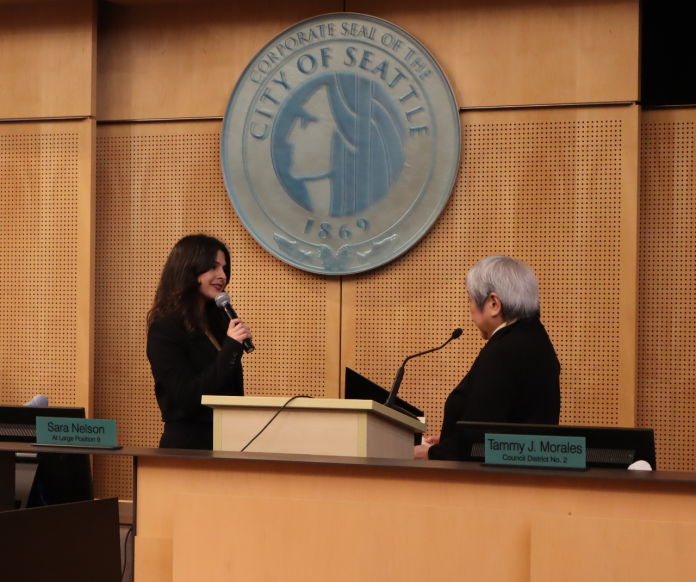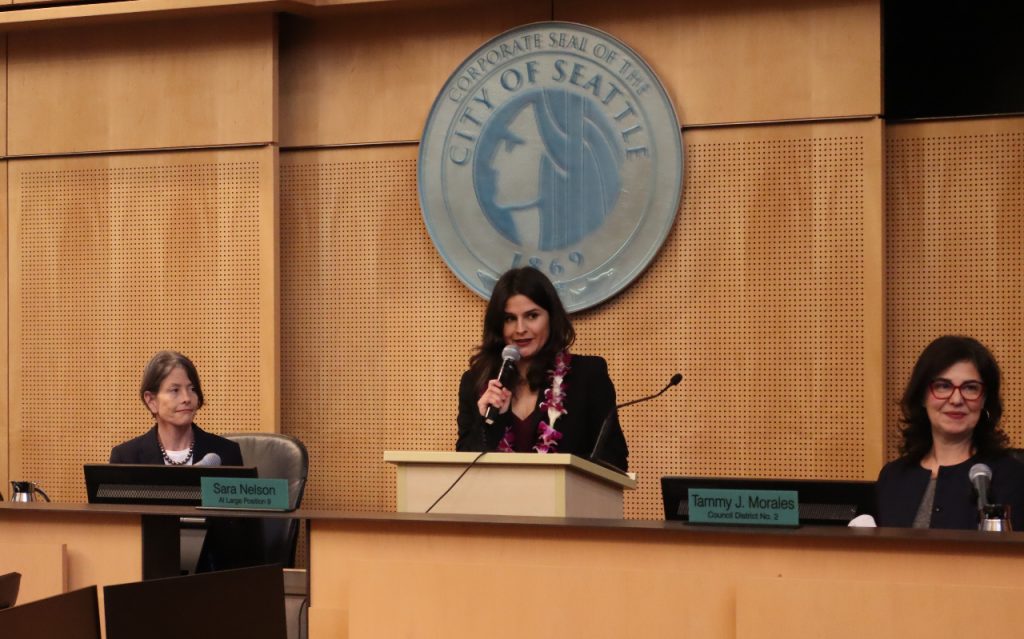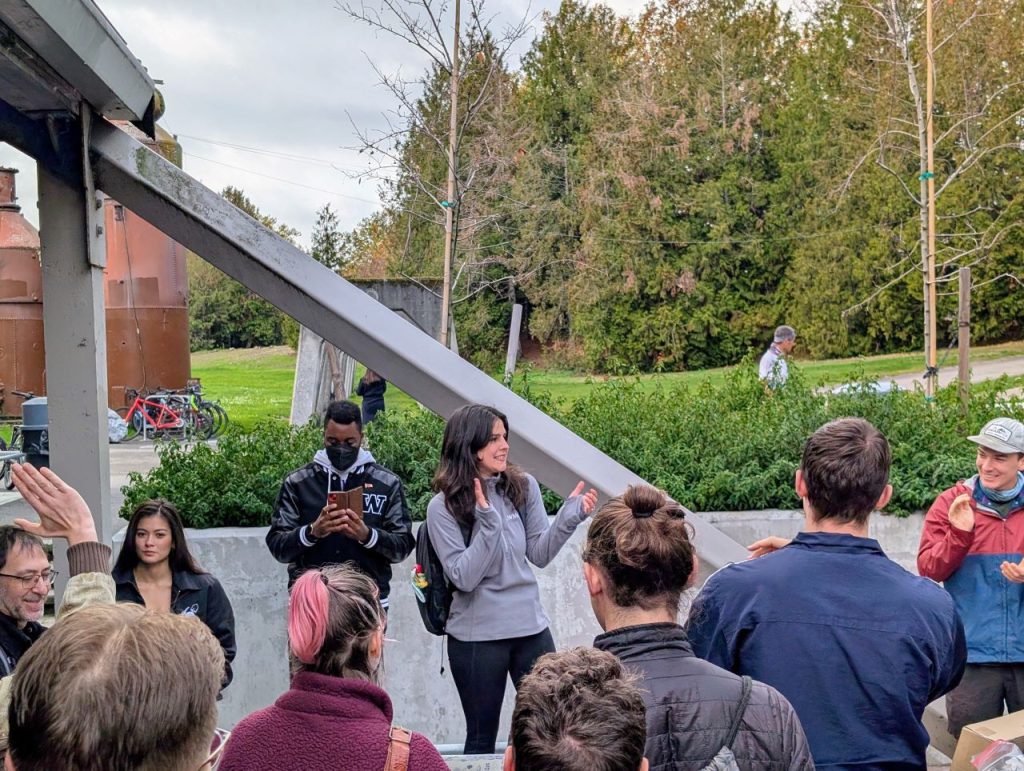
While Seattle Mayor Bruce Harrell recently said he would seek opportunities to partner with President-Elect Trump and not greet him “with his fist balled,” Alexis Mercedes Rinck struck a different tone during inaugural comments at her first Seattle City Council meeting Tuesday.
“The specter of a second Trump presidency isn’t just a political challenge; it’s a direct threat to families like mine and so many in this city, and that’s why what we do here in Seattle matters now more than ever,” Rinck said. “In a time where some would build walls, we can build bridges. When some can sow division, we can foster unity. And when some would tell you that you don’t belong, we can say loud and clear: you are home. Seattle belongs to you too, because that’s who we are. We are a city that doesn’t just talk about progress. We build it day by day, block by block, community by community.”
Last month, Rinck won election with a decisive 17-point victory over centrist appointee Tanya Woo. Among progressives, the victory inspired hope at the possibility of momentum again after taking losses in the 2021 and 2023 municipal elections. Along with stridently progressive values and stances, it was Rinck’s personal story that appeared to resonate with voters.
In her speech, Rinck refenced her family’s immigrant roots, which she said reflected the hope and promise of America.
“My family fled El Salvador during the Civil War carrying nothing but hope and determination across borders,” Rinck said. “On my other side of my family tree, my ancestors left Poland escaping religious persecution, driven by that same yearning for freedom that has called so many to these shores. And when I think of their journeys, midnight crossings, the whispered prayers, the dreams they carried, I’m reminded that for millions of Americans, the promise of this nation isn’t just an idea — it’s a lifeline. It’s what gave my elders strength to build a life here in a community where your beginnings don’t define your destiny. But let me be clear that that promise is under threat, and we stand at a crossroads where the very values that made my family’s journey possible hang in the balance.”

In the spirit of building bridges, Rinck extended an olive branch to her colleagues, inviting them to partner in making Seattle more welcoming to all.
“Today I am not just swearing in to serve a city, but I’m swearing in to serve a movement,” Rinck said. “A movement built on the belief that everyone deserves dignity and respect. A movement that says our city belongs to everyone. A movement that declares in Seattle, we don’t just resist hate, we build something better. And to each of my colleagues, I’m ready to build with you.”
She proceeded to acknowledge each councilmember by name and pledged collaboration on the area of work they lead in committee.
Rinck predicted that worker protections and human rights would be under threat under a Trump presidency, especially for women, immigrants, and gay, lesbian, and trans individuals.
“I am honored to join the Council and look forward to working with them to tackle our city’s most pressing challenges to create a Seattle that works for everyone,” Councilmember Rinck said in a statement. “The stakes for our city are high, and we must stand firm in defending the rights of women, LGBTQIA2S+ communities, immigrants, and workers against both federal threats and local challenges. Together, we can build a strong, healthy, and inclusive community.”

After Rinck’s speech, councilmembers proceeded to finalize their state legislative agenda, which has been abridged significantly, shrinking from a 16-page document last year to a two-pager this year, with several progressive priorities left on the cutting room floor. Rinck succeeded in getting two amendments passed modifying that agenda.
The first amendment stated the Council’s intent to pursue new progressive revenue before raising taxes that hit the working class hardest. It passed narrowly with five yes votes and several abstentions.
The other amendment articulated an intent to increase affordable housing housing funding, with Rinck noting local funding could help Seattle leverage state funds and overcome the prospect of a dip in federal support under Trump.
Passing two walk-on amendments in her first day could be a sign that Rinck is ready to hit the ground running as a councilmember, as Council President Sara Nelson acknowledged in a press release after the meeting.
“I am excited to welcome our newest member, who is ready to hit the ground running,” Nelson said in a prepared statement. “Councilmember Rinck joins us at a pivotal time, as we continue to seek common-sense solutions and shared ground to best serve all of Seattle’s residents.”
Nonetheless, Rinck will have her work cut out for her to advance legislation, given the minority faction that progressives represent on a centrist-dominated council.
Rinck will serve on the land use, housing, and transportation committees and chair the Sustainability, City Light, Arts & Culture Committee, taking over for Woo. She will be vice chair of Libraries, Education & Neighborhoods Committee, which is chaired by Maritza Rivera.
Council will be busy next year and faces a tight window to amend and pass the Seattle Comprehensive Plan — which charts housing and infrastructure growth for the next 20 years — before a state deadline in July. Additionally, transportation committee will be signing off on the Seattle Department of Transportation’s work plan for the $1.55 billion transportation levy — albeit months after the measure passed in a landslide victory in November.
Winning a special even-year election entails only a one-year term for Rinck, who will face reelection in 2025 since that’s when Teresa Mosqueda’s term was up. Mosqueda was the last elected councilmember in citywide Position 8, but she vacated the seat when she won higher office in 2023 and now serves as a King County Councilmember.
Nelson will also face reelection in 2025, and may be looking at fending off a progressive challenger in the mold of Rinck.
Doug Trumm is publisher of The Urbanist. An Urbanist writer since 2015, he dreams of pedestrian streets, bus lanes, and a mass-timber building spree to end our housing crisis. He graduated from the Evans School of Public Policy and Governance at the University of Washington in 2019. He lives in Seattle's Fremont neighborhood and loves to explore the city by foot and by bike.


